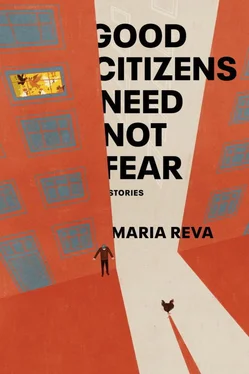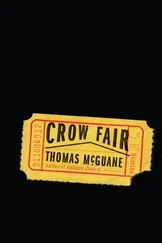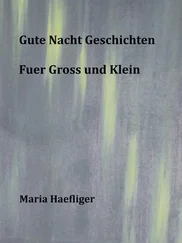Maria Reva - Good Citizens Need Not Fear - Stories
Здесь есть возможность читать онлайн «Maria Reva - Good Citizens Need Not Fear - Stories» весь текст электронной книги совершенно бесплатно (целиком полную версию без сокращений). В некоторых случаях можно слушать аудио, скачать через торрент в формате fb2 и присутствует краткое содержание. Город: New York, Год выпуска: 2020, ISBN: 2020, Издательство: Doubleday, Жанр: Современная проза, humor_satire, на английском языке. Описание произведения, (предисловие) а так же отзывы посетителей доступны на портале библиотеки ЛибКат.
- Название:Good Citizens Need Not Fear: Stories
- Автор:
- Издательство:Doubleday
- Жанр:
- Год:2020
- Город:New York
- ISBN:978-0-38554-529-7
- Рейтинг книги:3 / 5. Голосов: 1
-
Избранное:Добавить в избранное
- Отзывы:
-
Ваша оценка:
- 60
- 1
- 2
- 3
- 4
- 5
Good Citizens Need Not Fear: Stories: краткое содержание, описание и аннотация
Предлагаем к чтению аннотацию, описание, краткое содержание или предисловие (зависит от того, что написал сам автор книги «Good Citizens Need Not Fear: Stories»). Если вы не нашли необходимую информацию о книге — напишите в комментариях, мы постараемся отыскать её.
Good Citizens Need Not Fear: Stories — читать онлайн бесплатно полную книгу (весь текст) целиком
Ниже представлен текст книги, разбитый по страницам. Система сохранения места последней прочитанной страницы, позволяет с удобством читать онлайн бесплатно книгу «Good Citizens Need Not Fear: Stories», без необходимости каждый раз заново искать на чём Вы остановились. Поставьте закладку, и сможете в любой момент перейти на страницу, на которой закончили чтение.
Интервал:
Закладка:
Throughout the challenge poets such as Tsvetaeva, Inber, Mayakovsky, Shevchenko (this one I knew), and Tushnova were identified. The audience expressed their enjoyment of correct answers by whooping and clapping between names.
Konstantyn Illych waited for the lectorium to quiet down before he leaned into the microphone. “Who, whom.”
This, apparently, was also a poem; the crowd erupted in fervid applause. I made a mental note to alert my superiors that local culture was going down the chute.
Konstantyn Illych scanned the audience until his eyes met mine. “The gentleman in the front row, in the black peacoat,” he said. “Who wrote that poem?”
Once more the hall fell silent.
I turned right and left, hoping to find another man wearing a black peacoat in my vicinity. That’s when I saw Konstantyn Illych’s wife sitting behind me. She crossed her arms, her great bulging eyes on me, beckoning me to answer. One of her hands, nestled in the crook of her opposite arm, resembled a pale spider waiting to pounce.
Konstantyn Illych’s voice boomed above me. “The greatest poet of all time, Comrade, and you do not know? I’ll give you three seconds. Three…”
I froze in my seat. The middle-aged man to my right, whose nose looked like it had been smashed many times, nudged me in the ribs.
“Two…”
The man whispered “Grandfather Lenin!”—a mockery that I found in poor taste.
“One!” Konstantyn Illych bellowed. “Who was it, esteemed audience?”
The words rose from the crowd in a column. “Grandfather Lenin!”
Konstantyn Illych looked down at me from the stage, tsked into the microphone. Each tsk felt sharp, hot, a lash on my skin.
It was around this time I began to suspect that, while I had been following Konstantyn Illych, his wife had been following me. I forced myself to recollect the preceding week. Milena Markivna never figured in the center of my memories—the bull’s-eye had always, of course, been Konstantyn Illych—but I did find her in the cloudy periphery, sometimes even in the vacuous space between memories. If I stood five spots behind Konstantyn Illych in line for sausage, the hooded figure four spots behind me possessed Milena’s tall narrow-shouldered frame; if I sat three benches away from Konstantyn Illych, the woman two benches over had the same pale ankle peeking out from under the skirt. I began to see my task of retrieving the letter of apology in a new light.
What I suspected: My mission was not about the letter, but about the lengths I would go to retrieve it.
What I suspected: I was being vetted for a position of great honor.
What I knew: “Who, whom” had been a simple test, and I had failed it.
What I knew: My mother had been subjected to the same tests as a young woman, and had succeeded.
When I was a child, my mother was invited to join the Honor Guard. According to my father, she had always been a model student, the fiercest marcher in the Pioneers, the loudest voice in the parades. She was the champion archer of Ukraine and had even been awarded a red ribbon by the Kirovka Botanist Club for her Cactaceae collection. One evening, an officer came to our door and served my mother a letter summoning her to the Chief Officer’s quarters. Within six months she was sent to Moscow for special training, as only special training would suffice for the Guard that stands at the mausoleum of Lenin. Since our family was not a recognized unit—my parents hadn’t married because my paternal grandparents (now deceased) didn’t like my mother—my father and I could not join her in Moscow. I was too young to remember much about this period, but do have two recollections: one, I could not reconcile the immense honor of the Invitation with the grief that plagued the family; two, my father assumed care of my mother’s cactus collection, and every evening, when he thought I was asleep on the sofa bed beside him, wrapped his fingers around the spines of the plants and winced and grit his teeth but kept them there until his whole body eased into a queer smile. For many months his hands were scabbed and swollen. Within a year my father was gone also; he had at last been able to join my mother in Moscow. My grandparents told me that one day I, too, would join them.
Now that Milena Markivna had entered my life, I felt I had finally been noticed. The vetting process for the Honor Guard was still possible. My reassignment to Moscow to see my mother and father was still possible. I believed it was possible to make gains with hard work.
From that point on I followed Milena Markivna’s husband with greater vigilance, and in turn Milena Markivna followed me with greater vigilance. If Konstantyn Illych rifled his pockets for a missing kopek for the newspaper, Milena Markivna’s voice behind me would say, “Surely you have an extra kopek for the man,” and surely enough, I would. If I dropped a sunflower-seed shell on the floor while pacing the corridor outside the couple’s apartment, behind the peephole of Suite 76 Milena Markivna’s voice would say, “It’s in the corner behind you,” and surely enough, it was. She was a master observer, better than I.
(It should not go unsaid that, beyond mention of the reprimand of Milena Markivna’s family, and of her employment as a polyclinic custodian, her file contained little information. On the surface, this was because she was born in the province surrounding Kirovka and not in the town itself, but I suspected it was a matter of rank: if Milena Markivna were indeed my superior, tasked with the evaluation of my conduct and aptitude for ceremonial duty, of course I would not have access to her full history. Information is compartmentalized to mitigate leaks, much like compartments are sealed off in ships to prevent sinking.)
Konstantyn Illych grew accustomed to my omnipresence, even seemed to warm to it. Once, after a bulk shipment to the Gastronom, I watched him haul home a 30-kilogram sack of sugar. By the time he reached his building, Number 1933 Ivansk (at least, this was the theoretical address indicated in his case file—the building number appeared to have been chiseled out of the concrete), the sack developed a small tear. Konstantyn Illych would be unable to haul the sack up to the tenth floor without losing a fair share of granules. The elevator was out of the question due to the rolling blackouts, and so I offered to pinch the tear as he carried the load over his shoulder, and he did not decline. Many minutes later we stood in front of Suite 76, Konstantyn Illych breathless from the effort. Since I was there I might as well come in, he said, to help with the sack. He unlocked the steel outer door and the red upholstered inner door, then locked the doors behind us—all this with an excessive jingling of numerous keys. Here was a man with a double door, he wanted me to take note: a Man of Importance.
The apartment was very small, surely smaller than the sanitary standard of 9 square meters allotted per person, and only marginally heated. After we maneuvered the sack to the balcony, I scanned the suite for a trace of Milena Markivna—a blouse thrown over a chair, the scent of an open jar of hand cream, perhaps—but saw only books upon books, bursting from shelves and boxes lining the already narrow corridor, books propping up the lame leg of an armchair, books stacked as a table for a lamp under which more books were read, books even in the bathroom, all of them poetry or on poetry, all presumably Konstantyn Illych’s. A corner of the main room had been spared for a glass buffet of fencing trophies and foils, and on top of the buffet stood a row of family portraits. I tried to find Milena Markivna in the sun-bleached photographs but these, too, belonged to Konstantyn Illych—the large head made him recognizable at any age. I wondered if she lived there, if she was even his wife.
Читать дальшеИнтервал:
Закладка:
Похожие книги на «Good Citizens Need Not Fear: Stories»
Представляем Вашему вниманию похожие книги на «Good Citizens Need Not Fear: Stories» списком для выбора. Мы отобрали схожую по названию и смыслу литературу в надежде предоставить читателям больше вариантов отыскать новые, интересные, ещё непрочитанные произведения.
Обсуждение, отзывы о книге «Good Citizens Need Not Fear: Stories» и просто собственные мнения читателей. Оставьте ваши комментарии, напишите, что Вы думаете о произведении, его смысле или главных героях. Укажите что конкретно понравилось, а что нет, и почему Вы так считаете.












